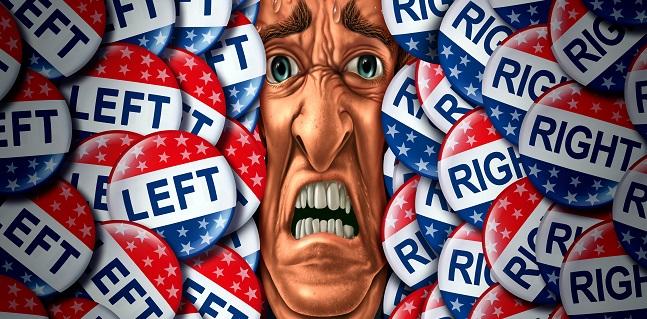Election-Related Stress May Spark Acute CV Events, Study Hints
The days after the 2016 US presidential election saw a bump in hospitalizations for acute MI and stroke.

As Americans approach the end of another presidential election cycle, a study from the integrated Kaiser Permanente Southern California system suggests that stress related to the contentious process might trigger acute cardiovascular events.
In the 2 days after Donald Trump was elected president in November 2016, rates of hospitalization for acute MI and stroke were significantly higher than they were the week before (rate ratio 1.62; 95% CI 1.17-2.25), researchers led by Matthew Mefford, PhD (Kaiser Permanente Southern California, Pasadena, CA), report.
Though the study did not include evaluations of stress among individual patients, the authors conclude that “transiently heightened cardiovascular risk around the 2016 election may be attributable to sociopolitical stress.” They add that “this analysis is timely given the polarized political climate preceding the 2020 presidential election.”
There are examples in the literature of how emotional strain resulting from large-scale events—such as earthquakes, hurricanes, terrorist attacks, major sporting events, and the COVID-19 pandemic—can be associated with adverse clinical outcomes. But, the investigators note, “there is limited research examining acute CVD surrounding elections, which have become increasingly divisive in recent cycles.”
Speaking with TCTMD, senior author David Williams, PhD, MPH (Harvard T.H. Chan School of Public Health, Boston, MA), noted that the American Psychological Association performed a national survey in 2017 showing that a large percentage of Americans said they were experiencing high levels of stress after the presidential election. Specifically, nearly half of respondents said the outcome of the election was a significant source of stress.
Thus, Williams said, the link between the 2016 election and acute CV events is “not out of the ordinary of the kinds of effects we have seen for stressful life experiences in the past.”
He added, “It’s a wake-up call for us . . . that there can be clinical consequences to the stress levels that many face regarding events like elections.”
Plausible Mechanisms
For the current study, published online October 12, 2020, ahead of print in PNAS, Mefford, Williams, and colleagues examined data on nearly 3 million people (53.2% women) receiving care within the Kaiser Permanente Southern California system. Most people (63.9%) were ages 18 to 54, and there were large proportions of white and Hispanic individuals (37.8% and 41.4%, respectively).
Acute CVD hospitalizations were defined as inpatient or emergency department discharge diagnoses of acute MI or stroke. The rate in the 2 days after the 2016 election was 573.14 per 100,000 person-years, which was significantly higher than the rate during the same 2 days the week prior (353.75 per 100,000 person-years). The findings were consistent across subgroups defined by age, sex, and race/ethnicity, although Williams noted that these analyses had insufficient statistical power.
Rates of acute MI and stroke, looked at individually, were each elevated immediately after the election (RRs 1.67 and 1.59, respectively). Admissions for chest pain and unstable angina were not increased, however.
Previous research has demonstrated a link between emotional stress and cardiovascular events, although the precise reasons for the relationship are not clear. “Potential physiological mechanisms facilitating these types of responses have been proposed, including vasoconstrictive and prothrombotic effects, lowering of the threshold for cardiac conduction system instability, increased cardiac sympathetic activation, inflammation, oxidative stress, and coagulation regulation,” the researchers explain.
Importance of Self-care
Commenting for TCTMD on the relationship observed in this study, Susan Everson-Rose, PhD, MPH (University of Minnesota Medical School, Minneapolis), said: “It’s a plausible scenario that they’re looking at, but because they didn’t measure individual perceptions of stress it really can only be kind of speculative as to whether the uptick in hospitalizations that they see can actually be attributed to any stress from the election or election outcome that people experienced.”
Nevertheless, the analysis “does give me pause to think about how these larger events can really impact people personally. Oftentimes we think that they don’t, but this kind of evidence suggests that they really do,” Everson-Rose said.
This underscores the importance of self-care to ameliorate stress, she continued. “Being aware of these sorts of things and then being aware of when you’re feeling triggered and knowing that you have to figure out how to remove yourself from the situation, whether that’s literally or figuratively, and learning different techniques to calm yourself, taking time for self-care—all those sorts of things that we hear about commonly, they really are critical.”
It’s a wake-up call for us . . . that there can be clinical consequences to the stress levels that many face regarding events like elections. David Williams
Williams, too, said the findings highlight the need for individuals to relieve stress by practicing self-care, remaining physically active, and getting enough sleep, adding that healthcare professionals need to be aware of this potential issue when taking care of patients. “These experiences can be consequential for our health,” he said. And it’s possible that certain segments of the population—such as those without access to healthcare—might be more vulnerable, although that would have to be looked at in other studies, Williams pointed out.
Future research should also focus on replicating these findings during other presidential election cycles, he said.
Moreover, Everson-Rose said, additional studies are needed to gain a more nuanced understanding of how sociopolitical events interact with preexisting risk factors and psychosocial well-being to influence risks of adverse health outcomes.
Todd Neale is the Associate News Editor for TCTMD and a Senior Medical Journalist. He got his start in journalism at …
Read Full BioSources
Mefford MT, Mittleman MA, Li BH, et al. Sociopolitical stress and acute cardiovascular disease hospitalizations around the 2016 presidential election. _PNAS+. 2020;Epub ahead of print.
Disclosures
- Mefford, Williams, and Everson-Rose report no relevant conflicts of interest.


Comments